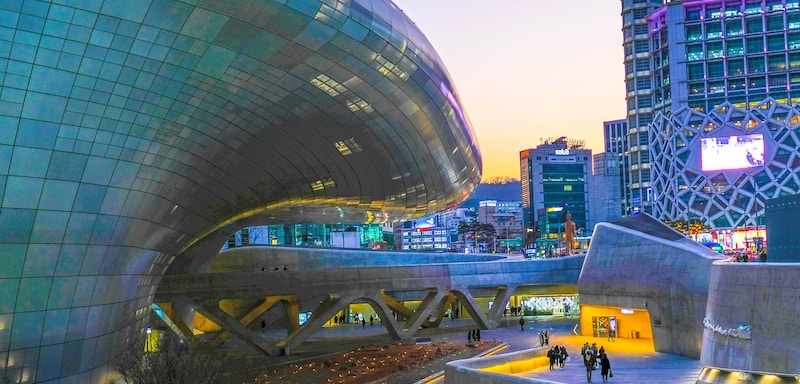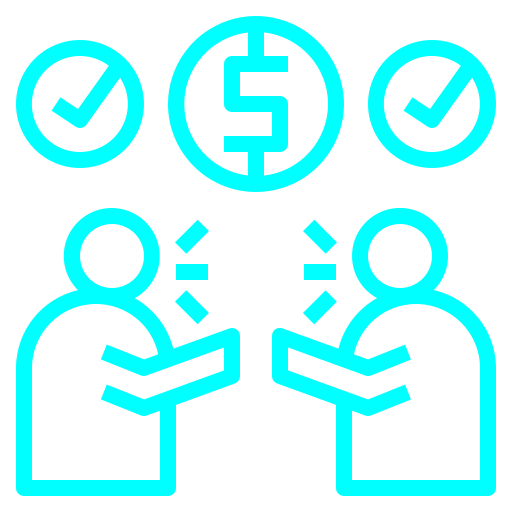In this guide to banking, money, and currency in South Korea, you’ll get our best travel money tips, from finding the best exchange rates to breaking down the average prices of local goods and services. Read on for all the details on navigating the local currency and banking system in South Korea.
An amalgamation of the Chinese word yuan and the Japanese yen, the won is the official currency of South Korea. As a rapidly developing, modernized country, the won enjoys good performance and stable rates in the global market. A favorable exchange rate with US dollars also makes South Korea a good budget-friendly destination for American travelers.
Here’s everything you need to know about using South Korean won while visiting South Korea, from where to get it to how to navigate cultural sensitivities regarding money.
- Travel Money in South Korea: Everything You Need to Know
- How to Get South Korean Won
- Cost of Goods and Living in South Korea
- Importing and Exporting South Korean Won
- Counterfeit South Korean Won
- Using US Dollars in South Korea
- Using Credit Cards in South Korea
- Cultural Sensitivities Around Money
- Preparing for Your South Korea Trip
Travel Money in South Korea: Everything You Need to Know
South Korean Won Basics
- Currency Code: KRW
- Symbol: ₩
- Forms: Bank notes, coins
- Division: 1 won = 100 jeon
- Countries of Use: South Korea
Denominations
South Korean won is available in 2 physical forms: banknotes and coins.
- Banknote denominations: ₩1,000, ₩2,000 (rarely used), ₩5,000, ₩10,000, ₩50,000
- Coin denominations: ₩1 (rarely used), ₩5 (rarely used), ₩10, ₩50, ₩100, ₩500
South Korean Won Exchange Rates
The current exchange rate for USD to KRW is: US$1.00 = 1,322.7 KRW, though it constantly fluctuates.
Because exchange rates are subject to change, it’s essential to check the rates using an exchange rate calculator before making any currency exchanges. You should also compare rates and fees at different banks and currency-exchange offices to find the best exchange rate.
How to Get South Korean Won
While it is possible to get South Korean won outside the country at currency-exchange services in major airports and at some banks, it’s best to wait until you’ve arrived in South Korea to get the best exchange rates. Major international entry points, like Incheon International Airport, have currency exchange counters where you can exchange foreign currency for South Korean won and ATMs where you can withdraw won directly.
However, airports may not always have the best currency-conversion rate or may charge higher fees for exchanging money. If you want to get cash while at the airport, ATMs are recommended as the best method (although you’ll be charged a foreign transaction fee).
Currency Exchanges
Currency exchanges or money changers can be found at major airports and throughout big cities, like Seoul. In Seoul, you’ll find many currency exchanges offering competitive rates in popular tourist areas like Itaewon, Myeongdong, Hongdae, and Dongdaemun.
Cash Advances at ATMs
One of the easiest and safest ways to get South Korean won is from ATMs. Widely available throughout the country in banks, public transit centers, stores, and even some hotels, most South Korean ATMs accept foreign debit cards to withdraw Korean won in cash. Although you’ll find ATMs throughout the country, you’ll have the best luck easily locating them in major cities. In rural areas, they may be less widely available.
It’s important to double-check what kind of ATM you’re using, as some won’t accept foreign cards and only take South Korean cards. Practice common sense when making ATM withdrawals: Be aware of your surroundings, take out money in well-populated areas only, and double-check for card readers just in case.
In South Korea, ATM fees generally range from US$3 to $5 for foreign-transaction fees. Out-of-network ATM cash withdrawals can also incur a service charge. Check with your bank regarding foreign-transaction fees and international ATM fees before you leave.
Exchanging Currency at a Local Bank
Along with money changers, it’s also possible to exchange money from other countries for South Korean won at South Korean banks, like Woori Bank, KEB Hanna, Shinhan Bank, and Kookmin Bank. Be sure to bring your passport as a form of identification when you go to exchange money.
Cost of Goods and Living in South Korea
For the most part, the favorable exchange rate between USD and KRW means that South Korea is a fairly affordable, reasonably priced destination for US travelers. You can expect to pay more for things like hotels in major cities, like Seoul, but compared to other popular destinations in Asia, South Korea is a good budget-friendly getaway.
Here are the average costs of some expenses you may have as a traveler:
- Average daily expenditure: US$60 (budget) to $150 (high-end)
- Subway ride: $1 to $2 (get a T-money card for spending money on public transportation)
- Taxi: $3 base fare
- KORAIL train pass: $95 for an unlimited two-day pass
- Three-star hotel in city center: $250 to $350
- Meals: $9 to $12 (casual dining), $24 (mid-range)
Importing and Exporting South Korean Won
If you’re bringing more than US$10,000 or its equivalent in foreign currency, you’ll need to declare it when you enter the country.
Counterfeit South Korean Won
Due to security features like 3-D holographic images, South Korean won banknotes and coins are very hard to counterfeit. Investigations have shown that there is very little counterfeit won in circulation, so it’s not a big issue travelers need to worry about when exchanging or withdrawing money.
Using US Dollars in South Korea
While it is possible to pay for things in USD in major cities while visiting Korea, US currency is not widely accepted, and you may have to pay a higher rate, so it’s best to convert your dollars into South Korean won during your stay.
Using Credit Cards in South Korea
Credit cards and debit cards are widely used and accepted in South Korea, and are generally the most popular form of payment at restaurants, stores, hotels, and attractions. Mastercard and Visa are the most widely accepted. Contactless payment is more commonly available at major hotels, stores, and restaurants. While traveler’s checks should be accepted at major hotels and banks, they’re not as common or widely used as they once were.
Even though paying with a card is common practice, it’s still a good idea to carry cash for small purchases and pay for things like cabs. Don’t forget to inform your credit-card company before traveling to South Korea; you don’t want to lose access to your cards while traveling.
Credit Card Fees
If you opt for a cash advance, you may be subject to foreign-transaction fees or currency-conversion fees. Check with your credit-card company for further details.
Cultural Sensitivities Around Money
Using South Korean won during your travels around South Korea extends beyond knowing currency exchange rates. You should also be aware of any cultural sensitivities regarding money to avoid offending or incorrectly compensating locals.
Tipping Etiquette in South Korea
In South Korean culture, tipping in restaurants and bars isn’t standard practice and could even be considered rude. It’s also not expected for you to tip your taxi drivers or hotel staff. However, it is appropriate to tip your tour guides if you’re on a tour or excursion.
Bargaining and Haggling
Haggling over price is a common practice in traditional Korean markets, like Seoul’s Gwangjang Market. If you find yourself shopping or exploring in these areas, you can try your hand at bargaining for goods, like souvenirs and food. However, if you’re intimidated by the language barrier or don’t feel comfortable trying to negotiate, don’t feel obligated.
If you want to give it a try, though, follow these protocols to be respectful and polite:
- Greet the shopkeeper/seller formally by saying Annyeonghaseyo.
- Speaking in Korean and being polite and nice will go a long way toward making the shopkeeper like you.
- If there’s something specific you’re shopping for, do some research on average prices before going out. That way, you can know what to expect and help determine a fair price for both you and the vendor.
- It’s ok to walk away if the seller won’t meet your price.
- Don’t make a lowball offer, as this could offend the seller—hence why doing research beforehand is a good idea.
- Feel free to shop around and inquire at different stalls for different price comparisons.
Preparing for Your South Korea Trip
Obtaining a visa is an essential part of planning your trip. At Entriva, we can easily and efficiently help you with every aspect of getting a South Korea visa. Start your visa application process.
For more information on other aspects of travel to South Korea, including travel requirements, health and safety, and culture and traditions, visit our South Korea content hub.






